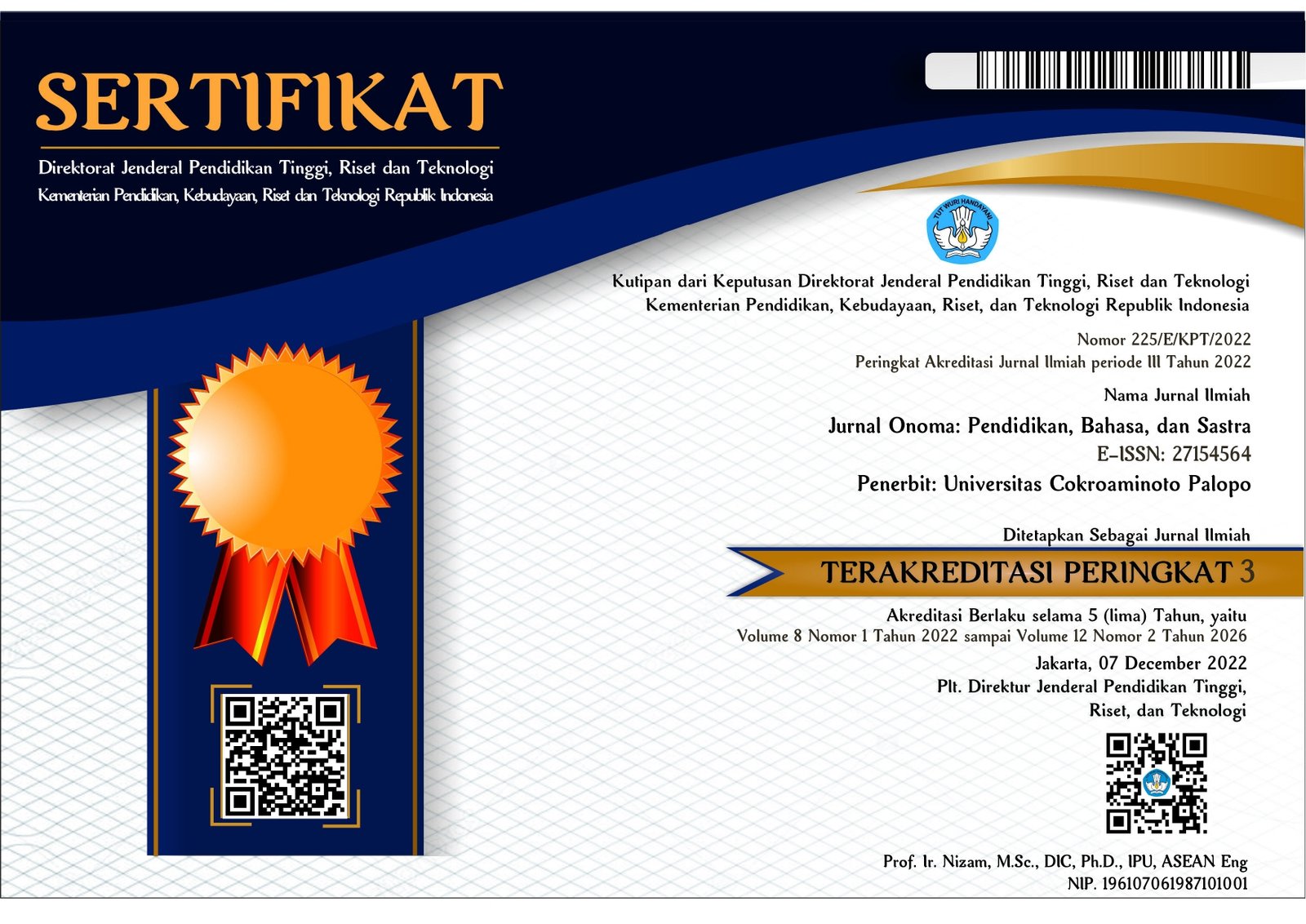The Students’ Productive Skills through TRB Test to Support SMCP Implementation
https://doi.org/10.30605/onoma.v11i1.4522
Keywords:
Productive skills, TRB test, SMCPAbstract
This research aimed to investigate the assessment of students’ productive skills (speaking and writing skills) through the Training Record Book (TRB) test in support of the implementation of Standard Marine Communication Phrases (SMCP). This research applied descriptive qualitative research. It was calculated first based on the aspects score of cadets’ speaking and writing skills, then described them in words qualitatively. The assessment Rubric by Brown (2004) and the semi-structured interview were applied in gathering the data which was conducted by cadets from Politeknik Ilmu Pelayaran Makassar. The speaking aspects overwhelmed grammar, vocabulary, pronunciation, and fluency. Meanwhile, the writing aspects involved organization, content, coherence, diction, grammar, and mechanics. The score range of each aspect was 1 to 4 with the score 1 being the lowest and the score 4 being the highest with their description. Then, a semi-structured interview was used in the research to obtain more data. In applying this type, the researchers provided a recorder, notes, and definitely some questions to ask, but remained flexibility so that other information could arise. Semi-structured interviews guided the researchers to investigate the cadets’ view of what was typically lacking and strong aspects of cadets' speaking and writing performance through the TRB test. The result of the research revealed that grammar is the lacking aspect for the cadets in both speaking and writing, while vocabulary and pronunciation were relatively stronger in speaking skills and the organization aspect was much stronger in writing skills. The research identified some reasons for this weaknesses including maladaptive language habits among seafarers, resistance to grammar learning, lack of motivation, student reluctance, and non-compliant speakers in speaking skills and students’ reluctance and Grammar resistance in the writing skills. This research revealed the crucial of concerning these weaknesses to improve the cadets’ ability to be able to communicate effectively so that it can lead to safety and operational efficiency.
Downloads
References
Brown, H. D. (2004). Language Assessment: Principles and Classroom Practices. Pearson Education.
Bhusal, A. P. (2021). Students' Reluctance to Participate in Writing Tasks: Challenges and Ways out. JMC Research Journal, 10(01), 12-23.
García, O., & Wei, L. (2014). Language Policy and the Role of Attitudes in Language Learning. Cambridge University Press.
Gautam, S. (2019). Writing Skills: A Key to Success in a Foreign Language. Journal of Language Learning and Teaching, 9(2), 34-45.
IMO. (2000). IMO Standard Marine Communication Phrases.
Jusmaya, M. (2023). Demotivating Factors in Grammar Learning. Journal of Language Teaching, 10(1), 12-29.
Khansir, A. A. (2015). Error Analysis and Second Language Writing. Theory and Practice in Language Studies, 5(3), 599-606.
Kürüm, D. (2016). The Importance of Speaking Skills in a Foreign Language Learning. International Journal of Language and Communication, 11(3), 78-92.
Morin, A. (2014). Maladaptive Behavior in Language Learning. In D. J. Spencer (Ed.), Behavioral Studies (pp. 234-250). Academic Press.
Saville-Troike, M. (2006). Introducing Second Language Acquisition. Cambridge University Press.
Srisermbhok, P. (2017). Motivation and Attitudes Towards Learning English: A Case Study of Thai University Students. Asian EFL Journal, 19(4), 98-117.
Subekti, H. (2020). Amotivation in Foreign Language Learning. Journal of Language Education and Research, 8(1), 45-58.
Training Record Book DPJL Perhubungan Laut PIP Makassar
Downloads
Published
How to Cite
License
In submitting the manuscript to the journal, the authors certify that:
- They are authorized by their co-authors to enter into these arrangements.
- The work described has not been formally published before, except in the form of an abstract or as part of a published lecture, review, thesis, or overlay journal.
- That it is not under consideration for publication elsewhere,
- That its publication has been approved by all the author(s) and by the responsible authorities – tacitly or explicitly – of the institutes where the work has been carried out.
- They secure the right to reproduce any material that has already been published or copyrighted elsewhere.
- They agree to the following license and copyright agreement.
License and Copyright Agreement
Authors who publish with Onoma Journal: Education, Languages??, and Literature agree to the following terms:
- Authors retain copyright and grant the journal right of first publication with the work simultaneously licensed under Creative Commons Attribution License (CC BY 4.0) that allows others to share the work with an acknowledgment of the work's authorship and initial publication in this journal.
- Authors are able to enter into separate, additional contractual arrangements for the non-exclusive distribution of the journal's published version of the work (e.g., post it to an institutional repository or publish it in a book), with an acknowledgment of its initial publication in this journal.
- Authors are permitted and encouraged to post their work online (e.g., in institutional repositories or on their website) prior to and during the submission process, as it can lead to productive exchanges, as well as earlier and greater citation of published work.

















